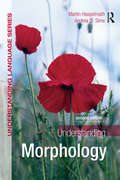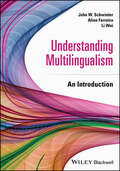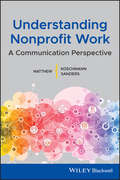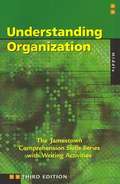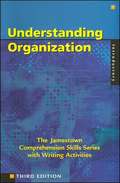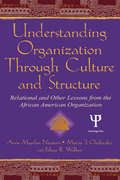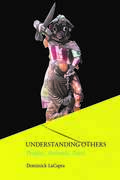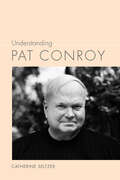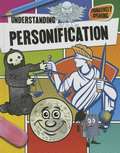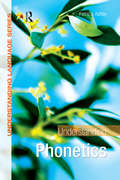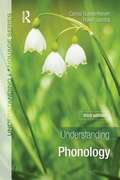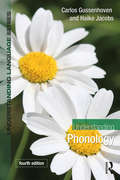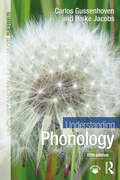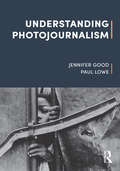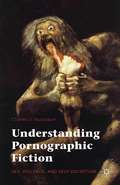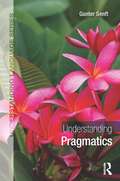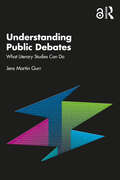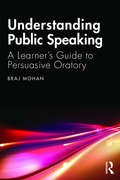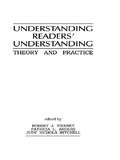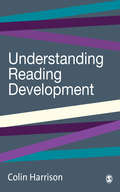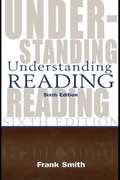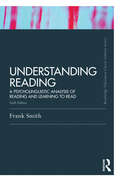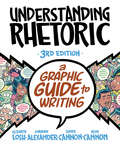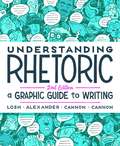- Table View
- List View
Understanding Morphology (Understanding Language)
by Martin Haspelmath Andrea SimsThis new edition of Understanding Morphology has been fully revised in line with the latest research. It now includes 'big picture' questions to highlight central themes in morphology, as well as research exercises for each chapter. Understanding Morphology presents an introduction to the study of word structure that starts at the very beginning. Assuming no knowledge of the field of morphology on the part of the reader, the book presents a broad range of morphological phenomena from a wide variety of languages. Starting with the core areas of inflection and derivation, the book presents the interfaces between morphology and syntax and between morphology and phonology. The synchronic study of word structure is covered, as are the phenomena of diachronic change, such as analogy and grammaticalization. Theories are presented clearly in accessible language with the main purpose of shedding light on the data, rather than as a goal in themselves. The authors consistently draw on the best research available, thus utilizing and discussing both functionalist and generative theoretical approaches. Each chapter includes a summary, suggestions for further reading, and exercises. As such this is the ideal book for both beginning students of linguistics, or anyone in a related discipline looking for a first introduction to morphology.
Understanding Multilingualism: An Introduction
by Li Wei John W. Schwieter Aline FerreiraIncluding detailed discussions of both the current state and future directions of the field, this comprehensive textbook presents a complete overview of multilingualism. Written by internationally recognized researchers and educators, Understanding Multilingualism: An Introduction provides detailed coverage of the various dimensions of modern multilingualism. It highlights the interdisciplinary nature of the field by exploring the broad spectrum of different sociolinguistic, psycholinguistic, and neurocognitive approaches to the study of multilingualism. The text begins by defining and clarifying the scope of multilingualism studies as a distinctive, interdisciplinary field of inquiry. Subsequent chapters discuss the historical development and theoretical models of multilingualism, how the brain processes multiple languages, the effect of multilingualism on human cognition, how multilingual processing changes over the human lifespan, societal management of multilingualism, multilingual education, and impact of technological advancement on multilingualism. The book concludes by addressing the prospect of a post-multilingual world and methodological issues in studying multilingualism. Considers the cognitive and linguistic implications of multilingualism to applied linguistics and language acquisition Examines the connections between multilingualism and changing socio-political and economic landscapes Reviews modern theories, methods, and research findings in multilingualism studies Discusses complex topics at both the individual and societal level Features numerous exercises, discussion questions, assignments, further readings, suggested research topics, and real-life case studiesUnderstanding Multilingualism: An Introduction is the perfect primary textbook for undergraduate courses in multilingualism and bilingualism, and an excellent resource for advanced students in applied linguistics, sociolinguistics, psycholinguistics, second language acquisition, and foreign language education programs.
Understanding Nonprofit Work: A Communication Perspective
by Matthew L. Sanders Matthew A. KoschmannOffers a valuable resource for scholars, teachers, students, and nonprofit practitioners interested in understanding nonprofit work from a communication perspective This sophisticated yet accessible book explores the dynamics of organizational communication in the context of nonprofit work. It delves deeply into the subjects of communication and social construction and develops several key subject areas and issues including leadership, management, and governance; the marketization of nonprofit work; collaboration and organizational partnerships; meaningful labor; and international nonprofit work. Understanding Nonprofit Work: A Communication Perspective is the first resource to bring together the considerable and voluminous amount of communication scholarship and nonprofit research available in academia. Moving beyond the simplistic notion of communication as merely the transmission of information, it instead develops a more insightful approach to nonprofit work based on the concept of communication as social construction, explaining the implications and applications of this distinct communication perspective in ways that will benefit both communication scholars and nonprofit practitioners. Additionally, this book: Brings together a wealth of information in communication theory and nonprofit organizations in a thoughtful, approachable style Demonstrates the application and utility of a communication perspective across several key aspects of nonprofit work Written by two well-known scholars in the field with considerable experience in nonprofit work—teaching, research, volunteering, consulting, and board membership Understanding Nonprofit Work is an ideal book for advanced undergraduate and graduate level students in courses on nonprofit work, or broader classes on organizational communication and public administration that have units on the nonprofit sector. This book is also perfect for nonprofit professionals looking to develop a more sophisticated and insightful approach to their work.
Understanding Organization (The Jamestown Comprehension Skills Series with Writing Activities #Third Edition)
by McGraw-Hill Editors<P>Understanding Organization <P> The Jamestown <P>Comprehension Skills Series with Writing Activities
Understanding Organization (The Jamestown Comprehension Skills Series)
by McGraw-Hill Education StaffThe Comprehension Skills Series teaches students to become stronger, efficient readers by developing ten important, specific reading comprehension skills.
Understanding Organization Through Culture and Structure: Relational and Other Lessons From the African American Organization (Routledge Communication Series)
by Anne Maydan Nicotera Marcia J. Clinkscales Felicia R. WalkerUnderstanding Organization Through Culture and Structure: Relational and Other Lessons From the African American Organization presents an innovative view of organizations and the communication processes that constitute them. Arguing that human beings are communicatively embedded in their cultures, Anne Maydan Nicotera and Marcia J. Clinkscales, working with Felicia R. Walker, examine issues concerning task and relational orientations and the ways they and other cultural dimensions connect with organizational structure and function for predominantly African American organizations. Utilizing the results of their own research on organizations, they develop a set of humanistically-based models that illustrate how hidden cultural processes suffuse organizational life and are manifest through communication. Emphasizing the development of alternative theories and models of organizing which are rooted in African-American culture, such as team-based versus hierarchy-based interactions, this book explores such organizational functions as leadership and management, power, authority and control, communication and interpersonal dynamics, and cultural identity and human development. Applying their findings in a broader analysis of contemporary practices in organizational restructuring, the authors present research that serves as the foundation for generating several emergent models with significant implications for organizational systems. Understanding Organization Through Culture and Structure stimulates and inspires current researchers of organizational communication, and is certain to raise greater awareness of the operation of culture in organizing. The text is intended for scholars and students in organizational communication, management, organizational psychology, African studies, and related areas.
Understanding Others: Peoples, Animals, Pasts
by Dominick LaCapraTo what extent do we and can we understand others—other peoples, species, times, and places? What is the role of others within ourselves, epitomized in the notion of unconscious forces? Can we come to terms with our internalized others in ways that foster mutual understanding and counteract the tendency to scapegoat, project, victimize, and indulge in prejudicial and narcissistic impulses? How do various fields or disciplines address or avoid such questions? And have these questions become particularly pressing and not in the least confined to other peoples, times, and places? Making selective and critical use of the thought of such important figures as Sigmund Freud, Jacques Derrida, and Mikhail Bakhtin, in Understanding Others Dominick LaCapra investigates a series of crucial topics from the current state of deconstruction, trauma studies, and the humanities to newer fields such as animal studies and posthumanist scholarship. LaCapra adroitly brings critical historical thought into a provocative engagement with politics and our current political climate. This is LaCapra at his best, critically rethinking major currents and exploring the old and the new in combination, often suggesting what this means in the age of Trump.
Understanding Pat Conroy (Understanding Contemporary American Literature)
by Catherine SeltzerAn insightful look at the life and work of the extraordinary popular Southern writer.Pat Conroy’s novels and memoirs have indelibly shaped the image of the South in the American imagination. His writing has rendered the physical landscape of the South Carolina lowcountry familiar to legions of readers, and has staked out a more complex geography as well—one defined by domestic trauma, racial anxiety, religious uncertainty, and cultural ambivalence.In Understanding Pat Conroy, Catherine Seltzer engages in a sustained consideration of Conroy and his work. The study begins with a sketch of Conroy’s biography, which, while fascinating in its own right, is employed here to illuminate many of the motifs and characters that define his work and to locate him within southern literary tradition. Seltzer then explores each of Conroy’s major works, tracing the evolution of the themes within and among each of his novels, including The Great Santini, The Lords of Discipline, The Prince of Tides, Beach Music, and South of Broad, and his memoirs, among them The Water Is Wide and My Losing Season.Seltzer’s insightful close readings of Conroy’s work are supplemented by interviews and archival material, shedding new light on the often-complex dynamics between text and context in Conroy’s oeuvre. More broadly, Understanding Pat Conroy explores the ways that Conroy delights in troubling the boundaries that circumscribe the literary establishment—and links his work to existing debates about the contemporary American canon.
Understanding Personification (Figuratively Speaking)
by Paula SmithAttributing human qualities or characteristics to an object or idea is a form of figurative language called personification. This creative resource provides readers with strategies to recognize and decode this literary device. Imaginative examples and vibrant images make the words in this book "leap off the page!"
Understanding Phonetics (Understanding Language)
by Patricia AshbyAssuming little or no background knowledge and using original examples and exercises (with answers supplied), Understanding Phonetics provides you with an accessible introduction to the basics of phonetics and a comprehensive analysis of traditional phonetic theory - the articulation and physical characteristics of speech sounds. Examples from a wide range of languages are presented throughout using symbols of the International Phonetic Alphabet. To help you develop your skills in this alphabet, Understanding Phonetics includes ear-training exercises that are freely available online, along with audio files of authentic listening material, for you to download from www.routledge.com/cw/ashby. Understanding Phonetics outlines the production of consonants, vowels, phonation types, pitch and intonation, and aspects of connected speech. Reading through chapter by chapter, you will see your knowledge develop as you engage in the step-by-step phonetic study of a selected word. Understanding Phonetics is designed to be used not only as a class textbook but also for self-study. It can be read systematically or used for reference purposes.
Understanding Phonology
by Carlos Gussenhoven Haike JacobsThis widely acclaimed textbook provides a complete introduction to the phonology of human languages ideal for readers with no prior knowledge of the subject. This skilfully written text provides a broad, yet up-to-date, introduction to phonology. Assuming no previous knowledge of phonology or linguistic theory, the authors introduce the basic concepts and build on these progressively, discussing the main theories and illustrating key points with carefully chosen examples. A wide range of phenomena are covered: speech production, segmental contrasts, tone, quantity, prosodic structure, metrical relations and intonation. The main theories, including feature geometry and optimality theory are introduced, and their contributions to our understanding of phonology, as well as their shortcomings, are discussed objectively. This new edition has been updated and revised to meet the needs of today's students. Difficult points are given fuller explanation, references have been updated, and new exercises have been introduced to enable students to consolidate their learning.
Understanding Phonology (Understanding Language)
by Carlos Gussenhoven Haike JacobsUnderstanding Phonology, Fourth Edition provides a clear, accessible and broad introduction to Phonology. Introducing basic concepts, it provides a comprehensive account of phonological issues such as segmental contrasts; syllables and moras; quantity, tone, intonation and stress; feature geometry; and prosodic constituent structure. This new edition has been reorganized and revised with key features including: A brand new eResource at www.routledge.com/9781138961425, which contains a full answer key for all exercises, and audio recordings of illustrative examples; Illustrations in languages from all six continents and all major language families, including Arabic, Mandarin, Finnish, Zulu and Hawaiian; Over 140 exercises to test understanding, including new exercises involving larger data sets; Revised coverage of tone, stress and opacity in OT. Understanding Phonology is essential reading for students coming to this topic for the first time.
Understanding Phonology (Understanding Language)
by Carlos Gussenhoven Haike JacobsUnderstanding Phonology, Fifth Edition, provides a clear, accessible and broad introduction to phonology. Introducing the basic concepts, it provides a comprehensive account of phonological topics like segmental contrasts, syllables and moras, quantity, tone and intonation, word stress, and prosodic constituent structure. This new edition has been streamlined to match widely applied course requirements. Key features include: Reorganized chapters to introduce key concepts earlier and increase accessibility for new students. New developments and an updated bibliography. Illustrations from languages spoken all over the planet, including Arabic, Central Alaskan Yupik, Hawaiian, Mandarin, French, Yabem, Yanyuwa, Yine and Zulu. Over 100 exercises to test understanding. A consistent illustration of Optimality Theory as applied to word stress. Updated online resources for students and instructors, including audio files, a key to questions, teaching goals and PowerPoint slides. Understanding Phonology is essential reading for students coming to this topic for the first time.
Understanding Photojournalism
by Paul Lowe Jennifer GoodUnderstanding Photojournalism explores the interface between theory and practice at the heart of photojournalism, mapping out the critical questions that photojournalists and picture editors consider in their daily practice and placing these in context. Outlining the history and theory of photojournalism, this textbook explains its historical and contemporary development; who creates, selects and circulates images; and the ethics, aesthetics and politics of the practice. Carefully chosen, international case studies represent a cross section of key photographers, practices and periods within photojournalism, enabling students to understand the central questions and critical concepts. Illustrated with a range of photographs and case material, including interviews with contemporary photojournalists, this book is essential reading for students taking university and college courses on photography within a wide range of disciplines and includes an annotated guide to further reading and a glossary of terms to further expand your studies.
Understanding Politeness
by Dániel Z. Kádár Michael HaughPoliteness is key to all of our relationships and plays a fundamental part in the way we communicate with each other and the way we define ourselves. It is not limited only to conventional aspects of linguistic etiquette, but encompasses all types of interpersonal behaviour through which we explore and maintain our relationships. This groundbreaking exploration navigates the reader through this fascinating area and introduces them to a variety of new insights. The book is divided into three parts and is based on an innovative framework which relies on the concepts of social practice, time and space. In this multidisciplinary approach, the authors capture a range of user and observer understandings and provide a variety of examples from different languages and cultures. With its reader-friendly style, carefully constructed exercises and useful glossary, Understanding Politeness will be welcomed by both researchers and postgraduate students working on politeness, pragmatics and sociolinguistics more broadly.
Understanding Pornographic Fiction: Sex, Violence, and Self-Deception
by Charles NussbaumThis work defends two main theses. First, modern Western pornographic fiction functions as a self-deceptive vehicle for sexual or blood-lustful arousal; and second, that its emergence owes as much to Puritan Protestantism and its inner- or this-worldly asceticism as does the emergence of modern rationalized capitalism.
Understanding Pragmatics (Understanding Language)
by Gunter SenftUnderstanding Pragmatics takes an interdisciplinary approach to provide an accessible introduction to linguistic pragmatics. This book discusses how the meaning of utterances can only be understood in relation to overall cultural, social and interpersonal contexts, as well as to culture specific conventions and the speech events in which they are embedded. From a cross-linguistic and cross-cultural perspective, this book: debates the core issues of pragmatics such as speech act theory, conversational implicature, deixis, gesture, interaction strategies, ritual communication, phatic communion, linguistic relativity, ethnography of speaking, ethnomethodology, conversation analysis, languages and social classes, and linguistic ideologies incorporates examples from a broad variety of different languages and cultures takes an innovative and transdisciplinary view of the field showing linguistic pragmatics has its predecessor in other disciplines such as philosophy, psychology, ethology, ethnology, sociology and the political sciences. Written by an experienced teacher and researcher, this introductory textbook is essential reading for all students studying pragmatics.
Understanding Public Debates: What Literary Studies Can Do
by Jens Martin GurrBy historicizing and contextualizing them through readings of carefully selected literary texts, literary studies can contribute to understanding and rationalizing key debates waged in many pluralist societies today – whether on different conceptions of liberty, identity politics, historical commemoration, challenges of globalization or responses to climate change. Understanding Public Debates presents case studies including Milton's Paradise Lost, P.B. Shelley's 1820 Reform essay, Philip Roth's The Human Stain, the songwriting of Neil Young and Edward Young's 1720s Sea Odes, recent climate fiction as well as non-literary conflict narratives. Rather than mining texts for arguments for or against certain positions, this book is interested in how texts stage these debates by means of multiple perspectives, narrative situations or ambiguities. By suggesting how educators might use literary texts as conversation starters for more rational debates, the volume also contributes to Public Literary Studies. Three important fields are here brought together: (1) the study of societal debates and conflicts and the ways in which they challenge pluralist societies, (2) explorations of the societal functions of literature and of non-literary narratives and (3) discussions of the role and functions of literary studies. The book ends with ten crisp theses on how literary studies can contribute to understanding and rationalizing such conflictive debates.
Understanding Public Speaking: A Learner's Guide to Persuasive Oratory
by Braj MohanPublic speaking is a much coveted yet difficult art. This book illustrates the use of various linguistic devices and persuasive strategies with examples from the speeches of powerful orators in history. It systematically draws on the various approaches to public speaking and persuasive discourse to present new insights and techniques. The volume: Critically examines strategies of persuasive oratory. Draws on extensive investigation of a corpus of famous public speeches in history. Focuses on the needs of those who want to brush up their public speaking skills. The volume will be a key reference for aspiring civil servants, lawyers, business and corporate professionals, and politicians. It will be of great interest to scholars of linguistics, and political and business communication.
Understanding Readers' Understanding: Theory To Practice
by Patricia L. Anders Robert J. Tierney Judy Nichols MitchellThis collection features papers addressing current issues in reading comprehension from cognitive and linguistic perspectives. Organized into three sections, the volume investigates text considerations and reader-text interactions. Each paper presents a substantial and comprehensive review of theory and research related to cognition and reading comprehension.
Understanding Reading Development
by Colin HarrisonThis book focuses on how to understand reading processes and what it means to develop reading comprehension. With a wide-ranging theoretical basis, the author makes new connections between work in critical theory, cognitive psychology and literacy. Key features include: } how and why we read } evaluating response to reading } a whole-school approach to developing reading. This book is highly recommended to teachers, literacy coordinators and students and lecturers of masters and doctoral programmes with a reading or literacy focus.
Understanding Reading: A Psycholinguistic Analysis of Reading and Learning to Read
by Frank SmithUnderstanding Reading revolutionized reading research and theory when the first edition appeared in 1971 and continues to be a leader in the field. In the sixth edition of this classic text, Smith's purpose remains the same: to shed light on fundamental aspects of the complex human act of reading--linguistic, physiological, psychological, and social--and on what is involved in learning to read. The text critically examines current theories, instructional practices, and controversies, covering a wide range of disciplines but always remaining accessible to students and classroom teachers. Careful attention is given to the ideological clash that continues between whole language and direct instruction and currently permeates every aspect of theory and research into reading and reading instruction. To aid readers in making up their own minds, each chapter concludes with a brief statement of "Issues." Understanding Reading: A Psycholinguistic Analysis of Reading and Learning to Read, Sixth Edition is designed to serve as a handbook for language arts teachers, a college text for basic courses on the psychology of reading, a guide to relevant research on reading, and an introduction to reading as an aspect of thinking and learning. It is matchless in integrating a wide range of topics relative to reading while, at the same time, being highly readable and user-friendly for instructors, students, and practitioners.
Understanding Reading: A Psycholinguistic Analysis of Reading and Learning to Read, Sixth Edition
by Frank SmithUnderstanding Reading revolutionized reading research and theory when the first edition appeared in 1971 and continues to be a leader in the field. In the sixth edition of this classic text Smith’s purpose remains the same: to shed light on fundamental aspects of the complex human act of reading – linguistic, physiological, psychological, and social – and of what is involved in learning to read. The text critically examines current theories, instructional practices, and controversies, covering a wide range of disciplines but always remains accessible. Careful attention is given to the ideological clash that continues between whole language and direct instruction and currently permeates every aspect of theory and research into reading and reading instruction. In every edition, including the present one, Smith has steadfastly resisted giving teachers a recipe for teaching reading, while aiming to help them make their own decisions, based on research about reading, which is accessible to anyone, and their experience and personal knowledge of their students, which only they possess. To aid readers in making up their own minds, each chapter concludes with a brief statement of "Issues." Understanding Reading, Sixth Edition is matchless in integrating a wide range of topics relative to reading while, at the same time, being highly readable and user-friendly for instructors, students, and practitioners.
Understanding Rhetoric: A Graphic Guide To Writing
by Jonathan Alexander Elizabeth Losh Kevin Cannon Zander CannonAfter shaking up writing classrooms at more than 550 colleges, universities, and high schools, Understanding Rhetoric, the comic-style guide to writing, has returned for a third edition! Understanding Rhetoric encourages deep engagement with core concepts of writing and rhetoric. With brand-new coverage of fake news, sourcing the source, podcasting as publishing, and support for common writing assignments, the new edition of the one and only composition comic covers what students need to know--and does so with fun and flair.
Understanding Rhetoric: A Graphic Guide to Writing
by Jonathan Alexander Elizabeth Losh Kevin Cannon Zander CannonAfter shaking up writing classrooms at more than 450 colleges and universities, Understanding Rhetoric, the comic-style guide to writing that instructors have told us gets "nothing but positive responses from students," has returned for a second edition! Combining the composition know-how of Liz Losh and Jonathan Alexander with the comic-art credibility of Kevin Cannon (Far Arden, Crater XV) and Zander Cannon (Heck, Kaijumax), Understanding Rhetoric encourages deep engagement with core concepts of writing and rhetoric, as teachers and students alike have told us. With a new chapter on collaboration, unique coverage of writerly identity, and extensive discussions of rhetoric, reading, argument, research, revision, and presenting work to audiences, the one and only composition comic covers what students need to know--and does so with fun and flair. A new "Walk the Talk" feature in each chapter helps students see how to put concepts to use in their own reading and writing. And the detailed instructor's manual will help both novice and experienced instructors plan a course around Understanding Rhetoric.
